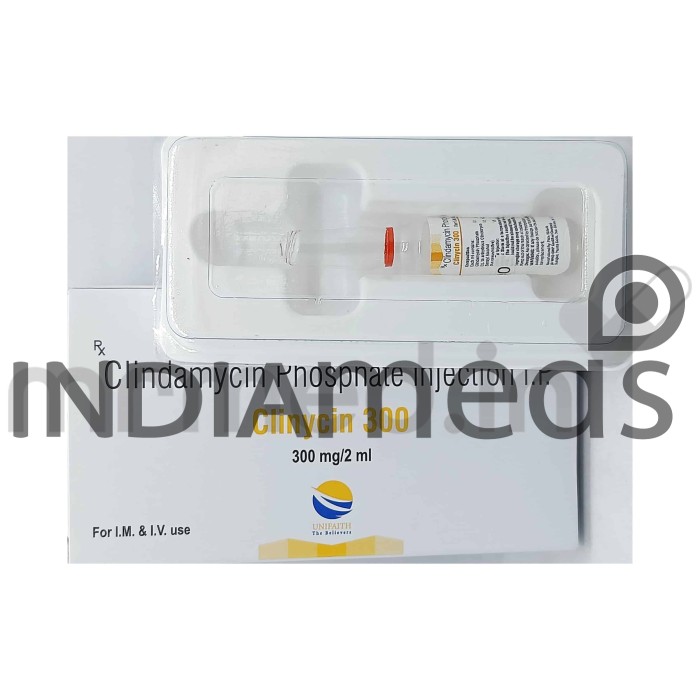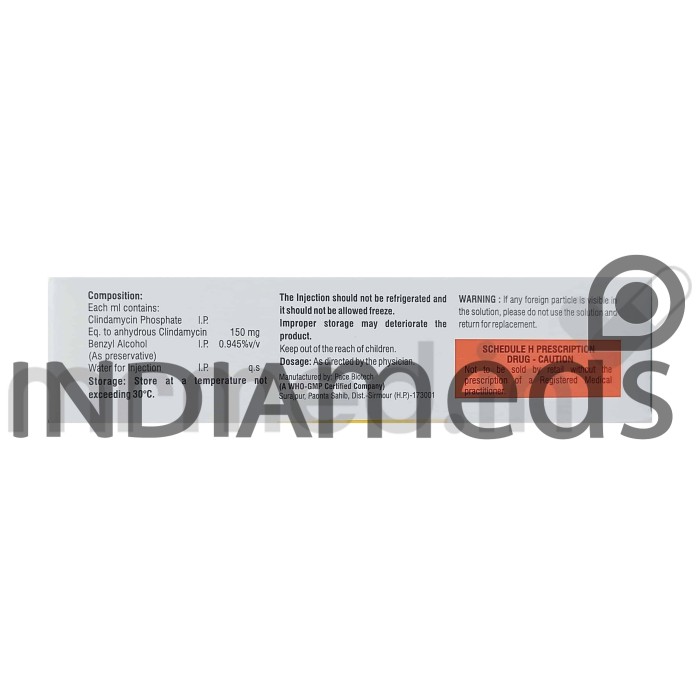Clinycin 300mg injection is a lincosamide drug that contains an active ingredient called Clindamycin. It belongs to the medication class known as an antibiotic. This medicine treats certain serious bacterial infections by inhibiting bacterial growth. Clinycin 300mg injection should not be consumed if you are allergic to Clindamycin, Lincomycin, or any of the ingredients in the medication.
Inform your doctor if you have a history of antibiotic-related diarrhea or stomach or intestinal issues while taking Clinycin 300mg injection. Notify your doctor immediately if you have severe or prolonged diarrhea, including bloody diarrhea. Mention any allergies (such as hay fever, asthma, or eczema), kidney, or liver problems to your doctor. Seek medical attention if you experience decreased urine output, fluid retention, swelling reactions, shortness of breath, or nausea.
Therapeutic Effects of Clinycin 300mg Injection
Pregnancy
Before taking Clinycin 300mg injection, inform your doctor if you are pregnant, planning to get pregnant, or think you may be pregnant.
Breast Feeding
Taking Clinycin 300mg injection while breastfeeding is unsafe. Before starting the treatment, inform your doctor if you are breastfeeding.
Lungs
It is unknown whether Clinycin 300mg injection is safe for patients with lung problems. Notify your physician if you have any lung disease before starting the treatment. Contact your doctor if you experience any lung-related symptoms.
Liver
Clinycin 300mg injection should be used cautiously in liver patients. Before starting the treatment, inform your physician about pre-existing liver conditions.
Alcohol
It is unknown whether consuming alcohol while taking Clinycin 300mg injection is safe. Please speak with your physician.
Driving
Clinycin 300mg injection could alter the driving ability or operating machinery capacity by causing dizziness, headaches, nausea, and tiredness.
Serious
- Bloody diarrhea
- Severe allergic reaction (wheezing, difficulty breathing, dizziness, swelling of eyelids, face, tongue, rash)
- Blistering and peeling of the skin
- Small blisters filled with yellow/white fluid
- Yellowing of skin and eyes
- Bleeding
- Severe, persistent, or bloody diarrhea with stomach pain or fever.
- Skin rashes, blistering, or peeling of large areas of skin.
- Jaundice (yellowing of the skin and eyes).
- Decreased blood cell count may result in bruising, bleeding, or a weakened immune system.
- Cardiac arrest
- Fluid retention
Common
- Inflammation of the veins (blood clot)
- Abnormal liver function
- Rash
Do not breastfeed while taking Clinycin 300mg injection. Notify your doctor if you experience any serious side effects. Your medical professional will inform you if you need any dose adjustments. Contact your doctor for more information. If you are scheduled for a surgical procedure or hospitalized, inform your doctor about your use of this medicine, as it may interact with certain medications and enhance their effects.
To manage the side effects of Clinycin 300mg injection, follow the prescribed dosage, and report side effects immediately to your doctor. Stay hydrated and maintain a healthy lifestyle, and attend follow-up appointments.
Clinycin 300mg injection can cause skin rash as an adverse reaction, indicating an allergic response or sensitivity. Consult your healthcare provider for proper evaluation and management.
Consult your medical professional regarding the use of Clinycin 300mg injection during pregnancy. The potential benefits and risks should be carefully assessed. Your doctor will suggest taking this medicine only if it's necessary.
Common side effects of Clinycin 300mg injection include inflammation of the veins (blood clot), abnormal liver function, and rash. It is crucial to consult your doctor for any concerns or persistent side effects.
Clinycin 300mg injection is available in different formulations, such as oral capsules, tablets, gel, cream, lotion, oral solution, vaginal cream, and injectable form. The choice of formulation depends on the specific treatment needs and the guidance of a healthcare professional.
| Molecule Name: Clindamycin | Therapeutic class: Antibiotic |
| Pharmacological class: Lincosamides | Indications: Treatment of bacterial infection |







